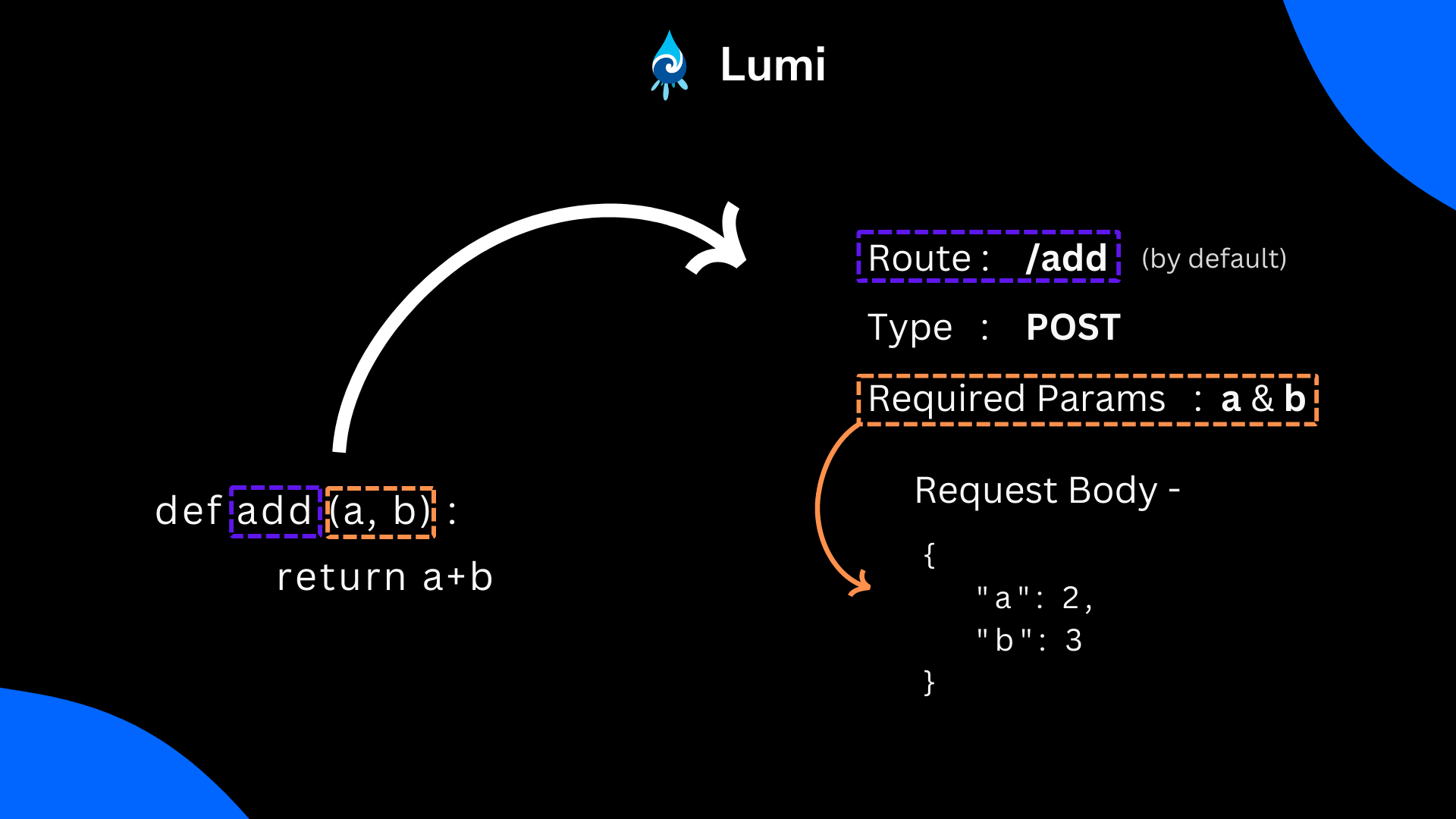https://github.com/tanmoysrt/lumi
Lumi is an nano framework to convert your python functions into a REST API without any extra headache.
https://github.com/tanmoysrt/lumi
apps framework http python rpc web
Last synced: 7 months ago
JSON representation
Lumi is an nano framework to convert your python functions into a REST API without any extra headache.
- Host: GitHub
- URL: https://github.com/tanmoysrt/lumi
- Owner: tanmoysrt
- License: bsd-3-clause
- Archived: true
- Created: 2022-11-24T08:56:22.000Z (almost 3 years ago)
- Default Branch: main
- Last Pushed: 2022-12-22T08:46:20.000Z (almost 3 years ago)
- Last Synced: 2025-04-09T16:16:19.876Z (7 months ago)
- Topics: apps, framework, http, python, rpc, web
- Language: Python
- Homepage: https://pypi.org/project/lumi/
- Size: 99.6 KB
- Stars: 629
- Watchers: 8
- Forks: 21
- Open Issues: 3
-
Metadata Files:
- Readme: README.md
- License: LICENSE.MD
Awesome Lists containing this project
README

Lumi is a nano framework to convert your python functions into a REST API without any extra headache.
* This library is created by taking the concept of **RPC** and blended with **REST API** specs.
* We need to just register the function and it will be available as a REST API.
* Web-server written with **Gunicorn**
* Local development server provided for rapid development and prototyping.
## Installation
```bash
pip install lumi
```
## Function <--> API mapping

## How to use 🤔
Let's create a simple function to add two numbers.
```python
def add(a, b):
return a + b
def subtract(a, b):
return a - b
```
Now, we want to expose this function as a REST API. We can do this by registering the function with Lumi.
```python
# app.py
from lumi import Lumi
app = Lumi()
app.register(add) # Registering the function
app.register(subtract)
app.runServer(host="127.0.0.1", port=8080)
```
Noice 🎉🎉 API has been generated
Run the sever by
```
python app.py
```
You are going to see this in your terminal
```
[2022-11-24 17:32:08 +0530] [10490] [INFO] Starting gunicorn 20.1.0
[2022-11-24 17:32:08 +0530] [10490] [INFO] Listening at: http://127.0.0.1:8080 (10490)
[2022-11-24 17:32:08 +0530] [10490] [INFO] Using worker: sync
[2022-11-24 17:32:08 +0530] [10492] [INFO] Booting worker with pid: 10492
...
...
[2022-11-24 17:32:08 +0530] [10500] [INFO] Booting worker with pid: 10500
```
Congratulations 👏. Our Server is online.
The above code will generate a REST API with the following details.
- Endpoint : `127.0.0.1:8080`
- Route : `/add`
- Method : `POST`
- Sample Request Body : `{"a": 1, "b": 2}`
Let's run the API and test it.
```curl
curl -X POST -H "Content-Type: application/json" -d '{"a": 1, "b": 2}' http://127.0.0.1:8080/add
```
Output
```json
{
"exit_code": 0,
"status_code": 200,
"result": 3,
"error": ""
}
```
## Custom Routing
Now you may think, the function name will be always same as the route. But, you can change the route by passing the route parameter.
```python
app.register(add, route="/addition")
```
## Custom Request Method
By default, the request method is `POST`. But, you can change it by passing the method parameter. Currently, it supports `GET`, `POST`, `PUT` and `PATCH` methods.
```python
from lumi import Lumi, RequestMethod
app = Lumi()
def add(a, b):
return a+b
# Default : Register function for POST method
app.register(add)
# Register function for GET method
app.register(add, request_method=RequestMethod.GET)
# Register function for POST method
app.register(add, request_method=RequestMethod.POST)
# Register function for PUT method
app.register(add, request_method=RequestMethod.PUT)
# Register function for PATCH method
app.register(add, request_method=RequestMethod.PATCH)
app.runServer()
```
🟡 **Pay attention before using GET request :** If you are using `GET` method
- You need to pass the parameters in the query string, as `GET` dont support request body.
- All those arguments, that will be passed to function will be in **String** format. So take care to convert them to the desired type in your function.
## Send File
Send file to user by returning the file object.
```python
from lumi import Lumi, RequestMethod
app = Lumi()
def download_file():
return open("file.txt", "rb") # Return file object
app.register(download_file)
```
## Debug Mode
By default, the debug mode is `True`. But, you can change it by passing the debug parameter.
```python
# app.py
from lumi import Lumi
app = Lumi(debug=False)
...
```
## Status Codes
| Status Code | Description |
| --- | --- |
| 200 | Request successfully executed and No Error happened during function execution |
| 500 | Request was received but there was an error during function execution |
| 400 | Bad Request (Possible Reason - The required parameters for the function has not provided) |
| 405 | Method Not Allowed (Lumi only supports **POST** request) |
| 404 | The route has no function associated with that |
## Exit Codes
| Exit Code | Description |
| --- | --- |
| 0 | No Error |
| 1 | Error |
> Note : If the function has some error , you can expect the exit code to be 1 and the error message in the response.
## Task Lists
- [x] Base System
- [x] Add support for default parameters that is provided in the function
- [x] Debug mode and logging support
- [x] Make available GET request for the function
- [x] Provide option to override POST with PUT if the user wants
- [x] Add support to send file directly to user
- [ ] Add support to serve files through a public folder [Customizable]
- [ ] Add suport for middleware integration
- [ ] Support nested routing of urls
- [ ] For local development, create an file observer that can automatically reload the server when the file is changed.
- [ ] Add support for object serialization and deserialization based on argument types of function
## Contributing
Contributions are always welcome!
## Our community
